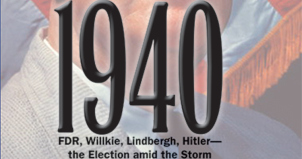Lessons from 1940: An Election on the Brink of War
As the world became embroiled in the fight against the Nazis, America gathered to decide on the president who would lead them through it. Susan Dunn’s book, 1940: FDR, Wilkie, Lindbergh, Hitler—the Election amid the Storm, documents this incredible moment in history when the US broke with tradition and elected FDR to his third term in office. Through this story, Dunn paints a picture of politicians ultimately rising above partisan differences to make the right decision for the country and for the world.
Presidential campaigns or “that most colorful American art form” as David Shribman describes them in his review of 1940 in the Wall Street Journal, tend to bring out the worst in our politicians, as they pander to interest groups and lash out at their opponents with rancorous words. FDR is cherished in the American imagination, a popular hero who guided the United States through the Depression and defeated Hitler, but even this beloved public figure, had to lie to the American people to win the election.
Although FDR opposed American isolationism, he promised the public that he would not let the United States become embroiled in Europe’s war several times approaching the Presidential Election. Marc Wortman explains on The Daily Beast, “FDR had good reason to fear that his inward-looking nation, still deeply traumatized by the Depression, would reject him and his start-and-stop efforts to rebuild the nation’s paltry national defenses.” FDR responded to the Republican campaign attacks on his foreign policy with promises he knew he would not keep, a lie he deemed necessary as the best man for the job of leading a country on the brink of war.
Reviewing 1940 in the The Washington Post, Jonathan Yardley compares the significance of FDR’s third term election to Abraham Lincoln’s election in 1860, declaring them the two most important elections in American history. The country, emotionally divided on the international issues united in selecting FDR to continue to guide the US out of the Depression and through the coming war. “History tells us that they chose well,” Yardley says. In 1940, Dunn highlights perhaps an even more historically successful decision, FDR and Wilkie’s ability to move past the “campaign oratory” with which they had attacked each other on international issues, in order to support the Lend-Lease arrangement, giving military equipment to the British. This bipartisan cooperation on high stakes and emotional issues should be inspirational in America’s current context of divided parties, international strife, and domestic economic challenges.





